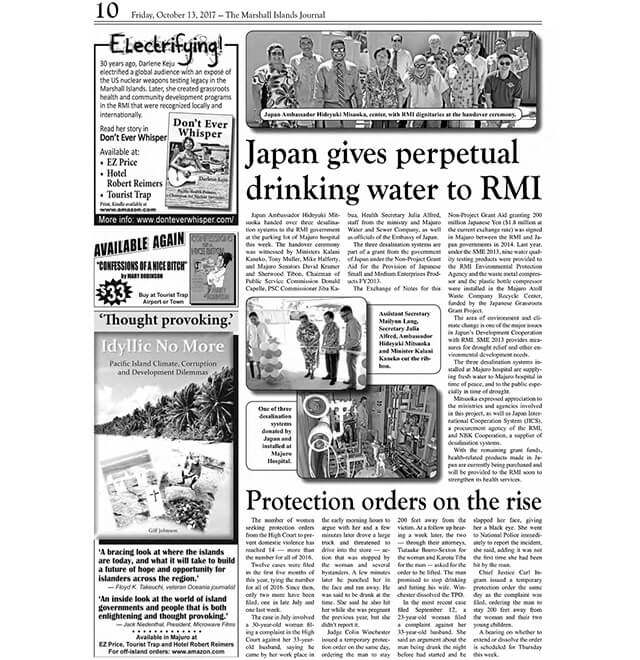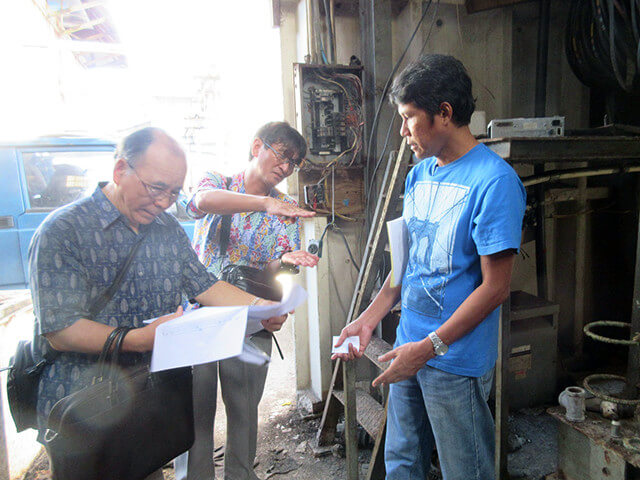実績紹介OUR PROJECTS
PROJECT2017.05
マーシャル諸島共和国向けの海水淡水化装置納入完了
日本国際協力システム(JICS)の中小企業ノン・プロジェクト無償案件において、マーシャル諸島共和国へ海水淡水化装置を3台供給、設置しました。
マーシャル諸島共和国は、エルニーニョ現象により降水量が激減し、政府は水の非常事態宣言を発表、現地の生活水が十分に確保できない状況です。
この淡水化装置は、マジュロ国立病院へ納入され、当病院への清水供給のために使用されますが、干ばつ等緊急時の非常用水としても使用され、現地の水資源確保の為に役立ちます。
Successful Completion of Japan’s Non-Project Grand Aid for Provision of Japanese Disaster Reduction Equipment FY2014 in the Republic of Marshall Islands
We, NBK Corporation, are pleased to announce that Japan’s Non-Project Grand Aid for Provision of Japanese Disaster Reduction Equipment FY2014, Grant Aid provided by Japan International Cooperation Agency (JICA), has successfully been completed in May 2017.
This project aims to secure stable water supplies for the hospital by installing those three desalination systems with the support of Grant Aid from the Government of Japan. Marshall Islands in recent years are suffering from a severe shortage of fresh water as drought worsens due to El Niño.
The desalination systems are dedicated to supplying fresh water to the hospital as well as to the public requirement of drinking water in case of drought.

- 客 先
- Marshall Water and Sewage Company
- 供与機材
-
海水淡水化装置
- Buyer
- Marshall Water and Sewage Company
- Item
-
Water Desalination Systems
PROJECT2017.11
JICAマーシャル諸島共和国廃潤滑油の ディーゼル燃料化 案件化調査実施
独立行政法人日本国際協力機構(JICA)からの委託業務、「廃潤滑油のディーゼル発電燃料化に関する案件化調査」をエイコーエコスパ株式会社(メーカー)、株式会社アンジェロセック(コンサルタント)とともに、2017年秋に無事完了しました。
第一次調査にて、マジュロで2,270 KL、イバイで125KLの廃油が処理できずにタンク内に備蓄されている状況を確認、続く第二次調査では、現地廃油に適合した実験機材を持込み、処理実験を実施しました。その後、最終の第三次調査にて、現地のカウンターパートである天然資源商業省、TOBOLARコプラ加工公社との間で、来年公募される「普及実証事業」に向けた覚書(MOU)を締結しました。
JICAによる普及実証事業が採択された暁には、マーシャルのマジュロ島内のTOBOLAR社の工場内にパイロットプロジェクトとして廃油処理装置を設置し、将来的に近隣島嶼国に向けて、同装置の横展開を図るプロジェクトに発展させる計画です。
Completion of the Feasibility Survey for Making Diesel Fuel from Waste Lubricating Oil
We, NBK Corporation, has completed the JICA’s feasibility survey for Making Diesel Fuel from Waste Lubricating Oil with EICOH-ECOSPA Corporation and INGÉROSEC Corporation in November 2017.
The first survey detected a large amount of waste oil in fuel tanks, 600,000gals in Majuro and 33,000gals in Ebeye respectively, however, there was no any practicable disposal solution plan. As the secondary research, a test research was implemented with experimental equipment, turning the actual waste oil into diesel one. Throughout those two surveys, the Ministry of Natural Resources and Commerce, and TOBOLAR Coconut Processing Authority signed a Memorandum of Understanding to prepare for a verification survey scheduled next year for the installation of actual Equipment in the TOBOLAR Factory in Delap.


